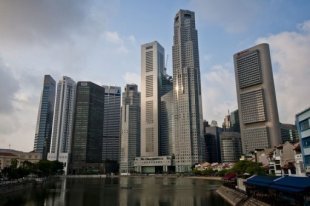insight
工程技术,地产投资,信仰家园,时尚生活Ku Swee YongWed, Sep 21, 2011

Singapore property prices have been holding up well despite weakness in the global economy. (AFP photo)
By Ku Swee Yong
In the first half of August, a few days after Standard & Poor's downgraded U.S. debt and caused a 600-point drop in the U.S. stock market, a related entity, S&P Equity Research, published their stock recommendations which consisted of big names such as General Electric, PepsiCo, McDonalds, Abbott Laboratories.
This list of high-quality companies were selected based on S&P Equity's opinion that investors should stick to traditional matrices such as dividends, consistent profits, strong cash flow, minimal debt, large cash reserves. Given the seesawing equities markets, they recommended that investors go back to basics and examine fundamentals.
The thin ray of positive light coming from the U.S. is for interest rates to remain low over the next two years, hopefully on the back of a U.S. recovery. Let's not forget that troubles in Europe and Japan may delay the U.S. recovery by some more.
Are there safe havens in Singapore property?
Citibank analysts Wendy Koh and Tan Chun Keong published their views on the Singapore property sector and stated that in the current environment, they prefer "defensive" stocks, reiterating their preference for REITs which have outperformed the broader market.
In that publication of 11 August 2011, they stated that the Federal Reserve's pledge to keep U.S. interest rates at record lows until mid-2013 will benefit REITs through low interest costs which can possibly widen profit margins.
Furthermore, since the Lehman Crisis three years ago, the Singapore REITs have maintained average debt-to-asset ratios which are a little above 30 per cent, i.e. they have a lot more room to leverage for acquisitions if attractively-prized assets could be found.
Similar to the recommendations by S&P Equity Research for the US stocks, S-REITs are preferred by Citibank for their strong cash flow, dividend streams and low debt.
There are investors who still want to invest in residential products because keeping cash is simply frustrating, when the cash is generating negative real returns. But turbulence and air pockets lie ahead. The rough patch may last over the next 2 years, or even longer and we need to select products that can weather the storm.
What are the safer choices in physical real estate?
Therefore, if REITs are considered "safe haven stocks" in the equities world, what might be considered "safe haven properties" in physical real estate? I risk sounding like a broken record, always recommending boring products but, in my mind, the characteristics of "safe haven" properties translate to:
1. Freehold or 999-year leasehold properties
2. Trading at more than 10 per cent discount relative to other projects within walking distance
3. Comes with a good quality tenancy contract of at least 3 per cent of gross rental yield
With the prices rising faster in the outskirts of Singapore, and prices of older freehold properties in districts 9, 10, 11 being stagnant, my choice targets are centered around properties in the core central region (CCR). Based on the above attributes, examples of properties that qualify might be: Aspen Heights, Valley Park, Mirage Tower, Palm Spring, Spanish Village, Holland Peak.
And given the low interest rates over the next two or more years, investors can consider taking on some borrowings to boost the cash-on-cash returns. However, leaning on the side of conservatism and allowing some space for errors, an investor can borrow at between 50-70 per cent of the property value and still sleep soundly even if the downpour should become a thunderstorm.
Recent GDP numbers for developed nations such as Japan, Germany and even Singapore are showing signs of weakness. There might be technical recessions in several countries, including the U.S. As one of my clients puts it succinctly, "For most global investors, it is back to basics again: food, energy and accommodation."
No matter how heavy the rain is, we need to eat, we need basic utilities and we need a roof over our heads.
Ku Swee Yong is founder of real estate agency International Property Advisor Pte Ltd, which provides services to high net worth individuals. This article is published courtesy of www.Propwise.sg, a Singapore property blog dedicated to helping you understand the real estate market and make better decisions. Get your free Property Beginner's and Buyer's Guide here.




